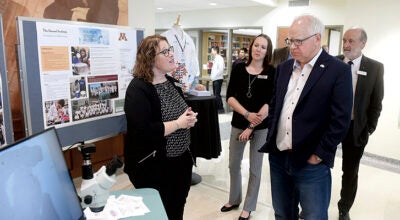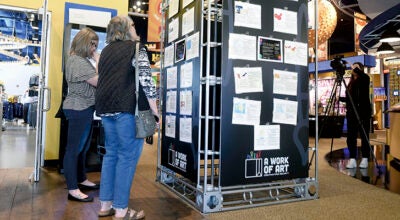Have a good day Mr. Viltz
Published 6:26 am Wednesday, April 14, 2010
“Naming what is bad or sad is vital not just for the sake of sturdy opinion but because of a mysterious property of the dynamic called repression. If one can build up the muscle openly to distain things deserving of disdain one frees up—wonderfully! Gratefully! —The muscle to praise things and to praise people who are worth praising.” — the late Carol Bly
I miss Carol Bly’s sturdy opinion and her building up the muscle openly to distain things deserving of distain. I think we are losing our voices and instead of expressing ourselves we are caught up with television news with its effort to influence our thinking or to alienate others.
Reading about what is best for students in the classroom is not about the curriculum, it’s about the quality of teachers, at least in my mind. And it’s also about the willingness of students. Way back when, when I was a student, aside from my first third grade teacher, I had good teachers.
Perhaps it would be beneficial to allow small groups of high school students interested in teaching as a career to spend time together in a classroom observing other students and then sharing their thoughts on what they observed. I suspect that college students still get together with their student teachers to discuss their efforts along with the complexities they will face and express their questions.
I know I was ill prepared for student teaching when I did practice teaching in Albert Lea. I remember one of the students, a tall lanky red-haired kid who used to call me Mr. Viltz, emphasizing the “z.” He stretched the “z” every time he raised his hand. I then asked Miss Tomkins if I could keep him after school? She gave me her blessing.
I had him write Mr. Vilt without the “z” on the end on the blackboard, column after column until he had filled the board with Mr. Vilt and then gave him permission to go. As he walked out, he turned with a smile on his face and said: “Goodbye Mr. Viltz” emphasizing the “z”. It only got worse when I came back to Austin to teach. I went back to the same classroom I treaded on years before. And there I was not Miss Morey or Miss Frost. I was lost.
Carol Bly had a short story about a girl in school who was a superb athlete with dark rings under her eyes. Two friends followed her home one day and discovered the abusive situation she faced in her family.
I asked our daughter if she had any thoughts regarding her education, but she said she didn’t want to be quoted. I left it at that. She spoke highly of some of the teachers she had over the years, and she too went to Banfield.
Getting back to Carol again, before her death, she and another friend, Cynthia Loveland, put a pamphlet together as a “gift from those who practice social work to those who practice business acumen (sharpness of mind) and the privileged life.”
In it, she points out a second tool for change—Empathy. In it she says, “It is especially hard to get through your head the point of view of someone of another class. After all, part of almost all privileged people’s psychological milieu is their felling entitled not to have to listen to and think about the point of view of unprivileged people.
The first step of empathy she tells is to decide that you are going to hear what the other person is saying. The second point: Keeping back your own immediate response. You can talk later. The third point of empathy: Ask the speaker, or yourself, if you are practicing empathy upon yourself, in order to see your own deeper take on this, some open ended questions. Open-ended questions are those that cannot be answered with yes or a no.
This past Monday was an historic day for Minnesota. It was the Twins’ first regulation game and victory at their new stadium. I long for the days of Bart Bartholomew, Lindgren, Joey Raso, Moose Skowran, Campoe, when the swinging bridge was our pathway to Marcuson Ballpark crossing the Cedar River. At that time, there was the knothole gang.
The highlight was the day I got to be the honorary batboy. I was overwhelmed.





